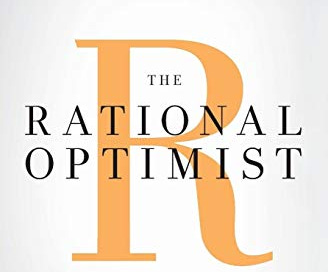est. reading time 2.5min
Today at a glance:
Summary of “The Rational Optimist: How Prosperity Evolves” by Matt Ridley. Ridley is best known as the author of a # of popular science books. This one is about optimism and how/why things will get better.
Stuff I read online this week that you might enjoy
Why did I read this?
In 2018 someone in SF recommended The Red Queen: Sex and the Evolution of Human Nature by Ridley. It made me think so I got the next one. The Evolution of Everything: How Ideas Emerge and then this one.
Ridley has a few hot takes in this book that many will disagree with.
Raw notes from the book:
Exchange of ideas, specialization in craft, and diversification in interests are critical to our progress.
Cooking enabled our ancestors to trade gut size for brain size and predisposed humans to swap food (early trade?)
Levels of trust and prosperity in society are correlated. Exchange breeds trust and visa versa
Agriculture diverts the labor of other species to provide service to human beings. Possible that agriculture worsened sexual inequality
Humans make up 0.5% of weight of animals on planet, but take 23% of primary production of land plans
Organic farming is low yield and nitrogen difficient. Organic movement insistence to rely on old agricultural practices means it misses out on environment benefits brought by future innovation
Urbanism and city design is progressive. Not only do cities help ideas expand, but they are also the right way to efficiently preserve our planet
Renewable energy eats landscape. Less land → higher food prices → less food
Ethanol is bad for planet. Gained traction in America because of lobbying from Big Co
Energy efficiency and energy demand have historically risen. We will come up with new ways (ex. portable nuclear reactors) to get energy.
Through ~50K years of history, no country remains a leader in knowledge creation and prosperity for too long. Why? (1) institutions/bureaucrats wrote too many rules to halt progress, (2) overpopulation, but can be solved now.
3rd reason = good times create weak men?
Innovators are in the business of sharing. Innovation is bottom-up. Individuals rather than institutions or society leaders create = a theme of this century
Pessimism sells. And we might be wired to consume it. Ignore
Critical assumption of pessimists is that if we stay course - we die. But we won’t stay course. We will find solutions. Most generations underestimated the potential of new ideas.
2 great pessimist stories of today: Africa and climate change.
Africa needs good property rights, abolish farm subsidies/quotas/import tariffs, and encourage growth of free trading cities.
Extreme climate outcomes are unlikely because they assume that progress will stop. They also neglect the fact that a warmer world is a richer world. A richer world will find solutions. Richest and warmest versions of future will have least hunger, longer life for all, better education. Richer versions will also find a solution to climate change.
Top 4 problems for humans we need to focus on are: hunger, dirty water, indoor smoke, malaria
Big ideas:
We live in an amazing world that is healthier and smarter than our past. And there are many reasons to be optimistic about the future. Be positive. Be an optimist.
Dark future scenarios may not be true. Important to think independently and based on facts. What are the trade-offs and what is the logic leading to X scenario vs Y.
Trust and exchanges of ideas are key to innovation. Share your ideas. Build with others (ex. in person teams?). We will create a better world.
Select quotes
Without trade innovation does not happen. Exchange is to technology as sex is to evolution
It is my proposition that the human race has become a collective problem-solving machine and it solves problems by changing its ways
Not inventing, and not adopting new ideas, can itself be both dangerous and immoral
The cumulative accretion of knowledge by specialists that allows us each to consume more and more different things by each producing fewer and fewer is, I submit, the central story of humanity
As I write this, it is nine o’clock in the morning. In the two hours since I got out of bed I have showered in water heated by North Sea gas, shaved using an American razor running on electricity made from British coal, eaten a slice of bread made from French wheat, spread with New Zealand butter and Spanish marmalade, then brewed a cup of tea using leaves grown in Sri Lanka, dressed myself in clothes of Indian cotton and Australian wool, with shoes of Chinese leather and Malaysian rubber, and read a newspaper made from Finnish wood pulp and Chinese ink.




